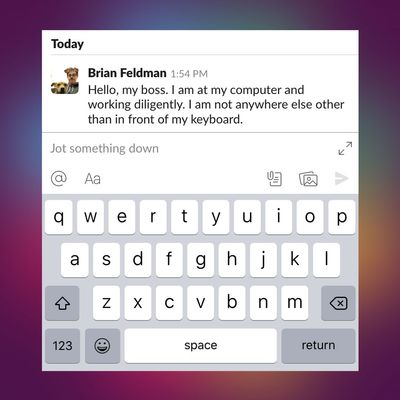
As the coronavirus ramps up into a global pandemic, thousands of urban office workers are being asked to work from home, powered by the internet, and video conference software, and chatrooms. In the grand scheme of things, this is not a terrible thing — we should be more worried about people who are not able or can’t afford to work from home — but working from home does come with its own hazards. You can go stir-crazy, you might spend so long in recline that you mess up your spine, you might eat an entire bag of Takis and hate yourself.
Many people are offering tips for working from home in this time, but I only have one:
Do not capitalize words on Slack (or your employer’s alternative enterprise text-chat solution).
You have to be absolutely hypervigilant about this. This is incredibly important. Maybe consider making intentional spelling and mechanical errors as well.
This advice is based on the gulf between writing on desktop operating systems and writing on mobile devices. The former often has less aggressive autocorrect than the latter, which will often replace words and automatically capitalizes words at the start of sentences and proper nouns. If you are trying to make others believe that you are sitting at your computer when you are not, these capitalized words are red flags.
For instance — hypothetically, not saying I’ve done this, and obviously I never would, because I am a good employee who is always working and focused — let’s say it’s easier to make a Trader Joe’s run in the middle of the day when the store is less crowded. So you, this hypothetical person, dip out for maybe 45 minutes to grab some snacks and stuff. But you want to seem like you’re still participating on Slack, so you check in on the mobile app and keep participating like you’re in a group text. Again, I’ve personally never done this and I resent the insinuation.
The problem is, your phone keeps capitalizing words. Everyone else receiving your messages immediately knows that you’ve stepped away from your computer. This is why it’s important to get in the habit of not fixing typos on your phone and, in some cases, actively making mistakes.
On desktop, you might say:
yeah i think jason has th e right idea. lets synergize our output and circle back for next steps
On mobile, you’d say:
Yeah I think Jason has the right idea. Let’s synergize our output and circle back for next steps.
Some details are more obvious than others. The uppercase letters at the start of sentences is a big one. The lowercase “I” is absolutely key to pretending you are still on desktop. Leaving off the period at the end of the final sentence in a message is also an authentic touch. And then you can throw in some other things, like using the wrong “lets” (versus “let’s”).
Also, consider sending each sentence as a new individual message, like you’re slamming the Enter key after each one. Big, paragraph-like blocks scream that you are afk and checking intermittently.
To be clear: I know that this is absolute psycho behavior.
Once you master this behavior, however, it becomes second nature — your thumb flying to toggle the Shift key before you can even think about whether or not you should. True mastery allows you to leave your computer open and awake, and maybe dip out to meet a friend for coffee, or take a long dog walk, or run some errands.
I hope all of this helps. This is my final blog post, because I have been fired. Bye!





























